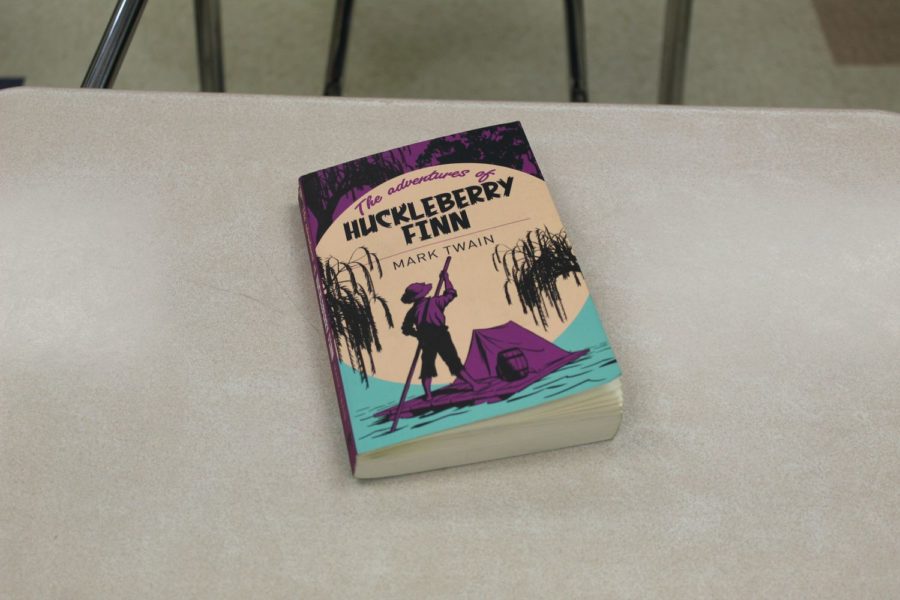Mark Twain’s Huckleberry Finn Remains Controversial Over a Century Later
The novel Huckleberry Finn has been the subject of much controversy due to its legacy in schools and the use of the “n-word” in reading the book.
The Adventures of Huckleberry Finn by Mark Twain has been a controversial and celebrated work since its publication in 1884.
Mark Twain’s book has been censored numerous times. Media coverage by CBS 60 Minutes, on March 10, 2011, covered the controversy of a publishing company that replaced the n-word with “slave.” With a new generation that uses the n-word in song lyrics, jokes, TV shows, comedy specials, movies, etc., its meaning has evolved.
Mr. Kevin Buddhu, Cam High English teacher, teaches the original version of The Adventures of Huckleberry Finn and discusses the topics of slavery and the “n-word” without using the word out loud. Instead, Buddhu chooses to write the word in quotations on the board and he skips over it when reading aloud to his classes.
“It is perhaps the most dangerous word in the American lexicon,” said Buddhu. “Its origins start in 1619, and the reverberations carry on until today. Toni Morrison dedicated Beloved to 33 million souls lost in the Middle Passage, and that was just the carnage prior to our shores.” Buddhu said the n-word allows for practices including redlining, lynching, and other violent acts against people of color.
Ms. Christine Lawler, Cam High English teacher, has taught The Adventures of Huckleberry Finn and believes in keeping the book unedited and unrevised to teach future generations about the past.
“We can’t hide from the ugliness of discomfort,” Lawler said. She allows her students to use the word from the direct text by writing it with quotations; however, students are not allowed to say it without the proper context. “This allows students to come together and participate in class discussions based on racism and the role the word plays in society now,” Lawler said.
“I have very strong feelings about not banning books, about not changing the original genius of the authors,” said Ms. Heidi Resnik, teacher-librarian at Cam High. “I’m an ardent defender of the first amendment, and I think in this modern age of half-truth, partial-truth, sub-truth, and lies that if we take away the truth–especially in the context of the time in which it was written–then we are not properly helping our younger generation learn about history from multiple perspectives, to learn about social issues in [the] 1800’s or any other time in history. I think we’re lying if we have the audacity to ban or change text.”
Resnik has not taught Huckleberry Finn or American Lit (English 3) before, but she taught Of Mice and Men by John Steinbeck — a book that has the n-word but does not receive as much criticism as Huck Finn. When teaching Of Mice and Men, Resnik made adjustments to her methods based on how well she knows the class she is teaching and what is happening in society currently.
In a classroom setting, Resnik believes in using the original text of works of literature. She said, “I can see where people would think that [the n-word] would fan the flames, but I would argue that it would foster great discussion to bring greater understanding about the individual and what people go through and their perspectives, experiences, and backgrounds.”

Hi, my name is Garrett. What's your favorite book? OMG that's my favorite too!

















































































![Senior Ditch Day... Relaxation or Truancy? [Video]](https://achsstinger.com/wp-content/uploads/2017/10/IMG_7119-900x599.jpg)
![Heavy Rain Hits Cam High [video]](https://achsstinger.com/wp-content/uploads/2017/02/maxresdefault-900x506.jpg)




Heidi Resnik • Oct 24, 2019 at 3:01 pm
Thank you, Garrett, for writing a thoughtful article. You are learning as a young journalist the importance of bringing difficult discussions to light in order to foster civil conversation. I appreciate your hard work and listening to details as exemplified by your accurate conveyance of what I communicated in our discussion. You and the Stinger Staff keep up the wonderful work!
All the best,
Miss Resnik
Ms. Lawler • Oct 14, 2019 at 2:02 pm
Very well written! The tone is objective and the content is fact-based, good job Garrett!